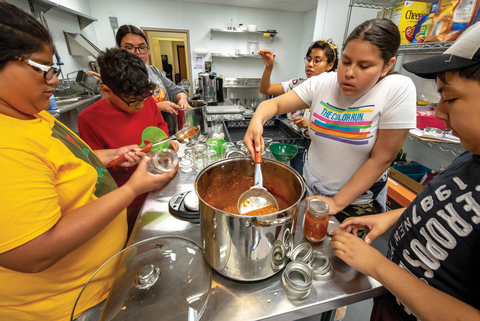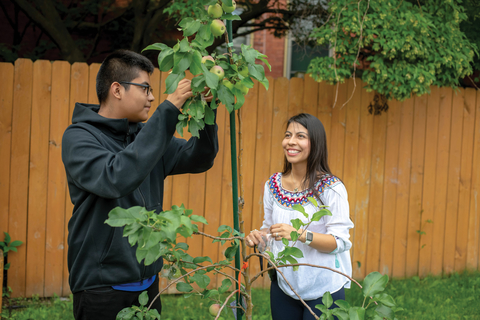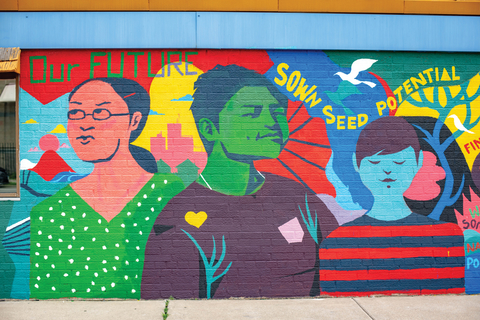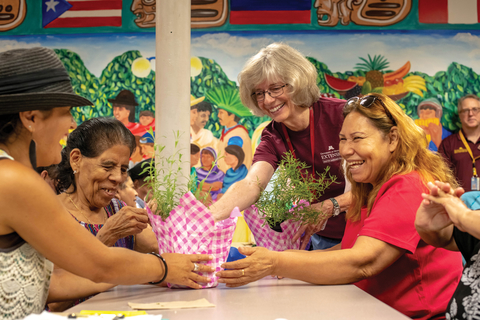Extension Master Gardeners are part of the promise for a bright future at Centro Tyrone Guzman Intergenerational Learning Community
You feel the vibrancy before you even walk into Centro Tyrone Guzman, a non-profit community center in Minneapolis. Colorful murals celebrating Latin-American culture—and sometimes acknowledging its pain—enliven exterior walls.
Inside, even windowless classrooms shine brightly with art and the flags of the nations from which its participants, or their parents, have arrived. Music fills your ears as you pass a dual-immersion preschool room. The clanging of ladles against pots and voices of teenagers making salsa arise from the kitchen. And the aroma of the peppers and the tomatoes—no wonder everyone seems happy to be there.
Outdoors, there is a garden so big it has a small orchard in it. Working among the apple trees is Natty Hels, University of Minnesota Extension Master Gardener volunteer intern. Growing up in the city, she never thought she would be showing the young people surrounding her how to protect fruit from pests.
But there she is, bringing the joys of gardening and knowledge about how to grow plants in Minnesota’s climate to her community.
Garden goals
Centro staff and Master Gardeners work together to meet participants’ needs, which can be complex and go beyond the planned lessons. Hels will soon be both staff and Master Gardener, when she completes her internship year with Extension’s Master Gardener program.
As the youth programs administrator at Centro, Hels works with the Raíces youth entrepreneur program. These youth have started a business making and selling salsa. Their goal is to grow their own vegetables for the salsa here in their garden. Thanks to Hels and Master Gardeners who have long been volunteering in this community, they’ll get there.
Mentors encourage and cross-pollinate
Becoming a Master Gardener requires volunteering as an intern with an experienced Master Gardener mentor. Sharon Decker is not only Hels’ mentor, she’s one of those who encouraged her to apply to the program. Hels then completed the core course, 48 hours of horticulture education taught by Extension faculty. “This is something that took my interest,” Hels says. “I can apply the knowledge to my job and I can also apply it to my personal life.”
For Decker, working with Centro is a way to create a more welcoming community and put the Spanish she has been studying for several years to good use.
Like Hels, Decker wasn’t sure at first if becoming a Master Gardener was something she could do. “I was under the mistaken impression that all Master Gardeners were basically horticulturalists and knew all plants by their Latin names,” she says. She soon learned it was much more approachable.
The relationship provides opportunities for what Decker calls “cross pollination.” While Hels mostly teaches youth and Decker teaches seniors, nothing is rigid at Centro. The observation beehive at Centro inspired Hels to learn about pollinators, for example, so she taught a class on bees for youth and seniors.
Wise Elders
Many of the seniors Centro serves face significant challenges, such as access to health care and transportation, isolation, language barriers, and health conditions like dementia or diabetes, according to Yoli Chambers, the adult and aging programs administrator at Centro.
Gardening helps them connect to nature and to their past. It fits with a goal to support the health and wellbeing of Latino seniors through educational and recreational activities. Extension SNAP-Ed educators also reach this and other Centro groups with nutrition education.
Many of the Wise Elders participants come from rural backgrounds and have experience in gardening and agriculture. “It’s something important to them that they miss a lot,” Chambers says. “During these sessions, they just come alive.”
That’s why when you walk by the Wise Elders classroom, you might find a group of seniors smelling potted plants and sharing their knowledge and stories about them with the Master Gardeners.
The Wise Elders classes are taught in Spanish. “I love that all the classes that the Master Gardeners provide here at Centro are delivered in the participants’ language,” says Chambers. The children and teens at Centro tend to be comfortable with English, and the seniors prefer Spanish. Master Gardeners like Hels, who are fluent in both languages, bring gardening to audiences who might otherwise be difficult to reach.
The future looks bright
The 2020 class of Master Gardeners has 311 members—the largest class ever. They join the 2,400-strong Master Gardener volunteer force. Based on application responses, the new class is interested in:
- Pollinators
- Horticulture skills
- Nearby nature
- Clean water
- Climate change
- Biodiversity
- Local food
Related stories
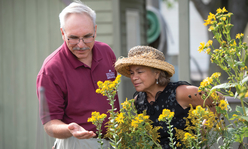
Becoming a Master Gardener
Returning from abroad, Scott Sindelar arrives fresh to the gardens of his local community.
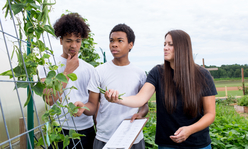
Schoolyard gardens
Schoolyard gardens plant seeds of better health and active learning.
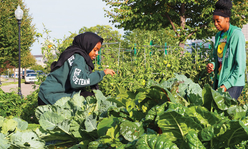
Green Garden Bakery
Master Gardener volunteers and Extension partners inspire kids in north Minneapolis to start a healthy desserts business.


